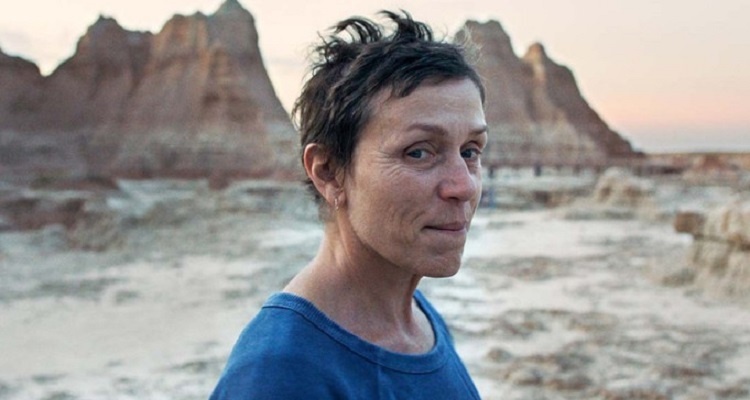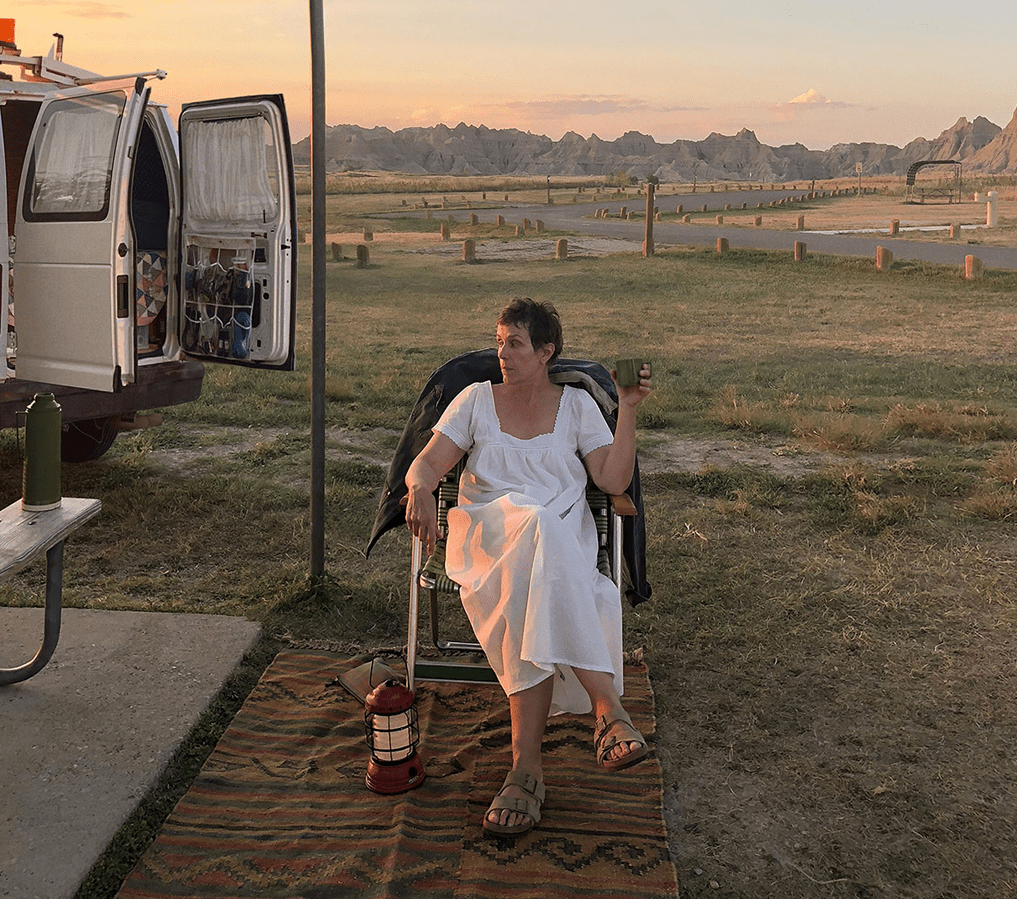Mein Dank für diese englischsprachige Gastkritik geht an Cliff Galiher, Filmexperte & -liebhaber aus Kalifornien, der Nomadland im September 2020 digital im Rahmen des 45. Toronto International Film Festival gesehen hat.

I’m not homeless, I’m just houseless.
Chloé Zhao continues to weave a cinematic tapestry from the vast heartland of America. As Nomadland begins, Fern (Frances McDormand) is leaving her home in the small factory town on the edge of the Nevada desert, just as it ceases to exist – the factory offering the majority of the local jobs has closed, everyone has gone and the postal code has been discontinued. Piling her household into a storage facility and her most essential treasures and provisions into a white van, she sets off onto the endless road. Fern seems well suited to life on the road – making fast relationships and then letting them go, learning the tricks to a comfortable life, embracing each new environment. Her history behind her, though, she continues to look back. Both from conversations with the new friends she makes on the road and from time spent by herself, poring over old photographs and slides, we learn pieces of her past. They’re only fragments, however, as she sets her sights on the horizon.
Fern’s dive into newfound freedom allows Chloé Zhao, who also wrote and edited the film, the chance for a rich expedition through the vast landscape. Originally from China, Chloé Zhao has shown a profound affinity with the communities tucked away in the deep folds of the United States, first with a Lakota Sioux Indian Reservation in Songs My Brothers Taught Me* and then with rodeo cowboys in The Rider. Like her first two movies, Nomadland is initially set in South Dakota, where Fern has found work as a seasonal employee at an Amazon Fulfillment Center. Fern intends at first to set down new roots but, prompted by little chance of another job and hints that she could edge toward vagrancy, she follows a friend’s suggestion to a nomad colony in the warm desert. Money is always in the back of her mind, though despite setbacks, the film never shifts into an economic thriller such as Kelly Reichardt’s Wendy & Lucy (2008) or Nicole Riegel’s Holler (also playing at TIFF). This is a road trip film, albeit one where the trip seemingly has no final destination.
Frances McDormand won her most recent Oscar for playing so well with extremes of outrage and pain (Three Billboards Outside Ebbing Missouri), here she shows a mastery of a subtler range of expression. Without a hint of a tear and barely ever raising her voice, she still imbues Fern with the dual friendliness and prickliness that define her screen persona. When asked difficult questions (“Are you homeless?” “Are you married?”), she quickly but cautiously thinks out her responses one word at a time (“I’m not homeless, I’m just houseless.” “I am, but my husband passed away.”) Barely raising her voice or showing a hint of a tear throughout the film, Frances McDormand still shows a tremendous range within a woman who is drawn to other people and fast to make friends, but who also pushes herself away from everyone. These contradictory urges come into play in a fascinating way in a quick, almost throwaway scene where, grazing against the world of her previous film, The Rider*, the twilight guitar playing of musician Cat Clifford interplays with a melancholy piano motif that accompanies Fern’s feelings of solitude. We’ve heard it before when she is on her own, but in this scene, it gently overpowers any urge she might have to connect.
Fern’s journey is captured with a true sense of majesty. Cinematographer Joshua James Richards, whose sweeping landscape photography granted an epic sphere to Zhao’s previous films as well as the rugged British romance God’s Own Country, gives Nomadland a delicate look. It’s hard to comprehend how vast America is between its large cities – Fern migrates thousands of miles between Nevada, South Dakota, Nebraska, Arizona, and finally California, but still leaves thousand after thousand unseen. Yet Fern always knows where she is, stopping to bathe in a stream, press her arms around an ancient redwood or scamper off into a sandstone labyrinth as she encounters each new landscape. Much of the film is shot in the chilly sunlight of morning or evening, framing Frances McDormand in gleaning rims of light. Her van, which she steadily builds into a better and better home, is presented as an intimate space that never seems too cramped.
Chloé Zhao populates Fern’s journey with nomads and locals who are in the same situation (and have the same name) as the characters they present on the screen. The characters of Swankie, Linda May and Bob emerge from people with real experiences behind them. We spend half an hour of the film before recognizing another actor, a weary but buoyant David Strathairn (also going by his own name), although the relationship expected to form between the two does not do so in a straightforward way. She will withdraw from people at slightest touch and shows no qualms about letting them go. Her connection with Dave, much like the plot overall, unfolds in organic, often unconnected incidents, always more interested in what’s over the next horizon than in what’s right up ahead. A flirtation scene is derailed with an accident that would play as pure comedy if not for one of many careful details about her past dropped into an earlier scene. Whether Fern will ultimately drift toward another person instead of away and whether she will move on from what she left behind, are what make her endless travels into a true (cinematic) journey.
Nomadland startet am 1. Juli 2021 deutschlandweit in den Kinos. Am 30. September erscheint das Meisterwerk dann bereits auf Blu-ray und DVD.*
*Amazon Affiliate Links / Anzeige: Wenn Du über einen dieser Verweislinks etwas bestellst, bekommt CinemaForever auf Deinen Einkauf eine kleine Provision. Dies ändert nichts an Deinem Kaufpreis.
